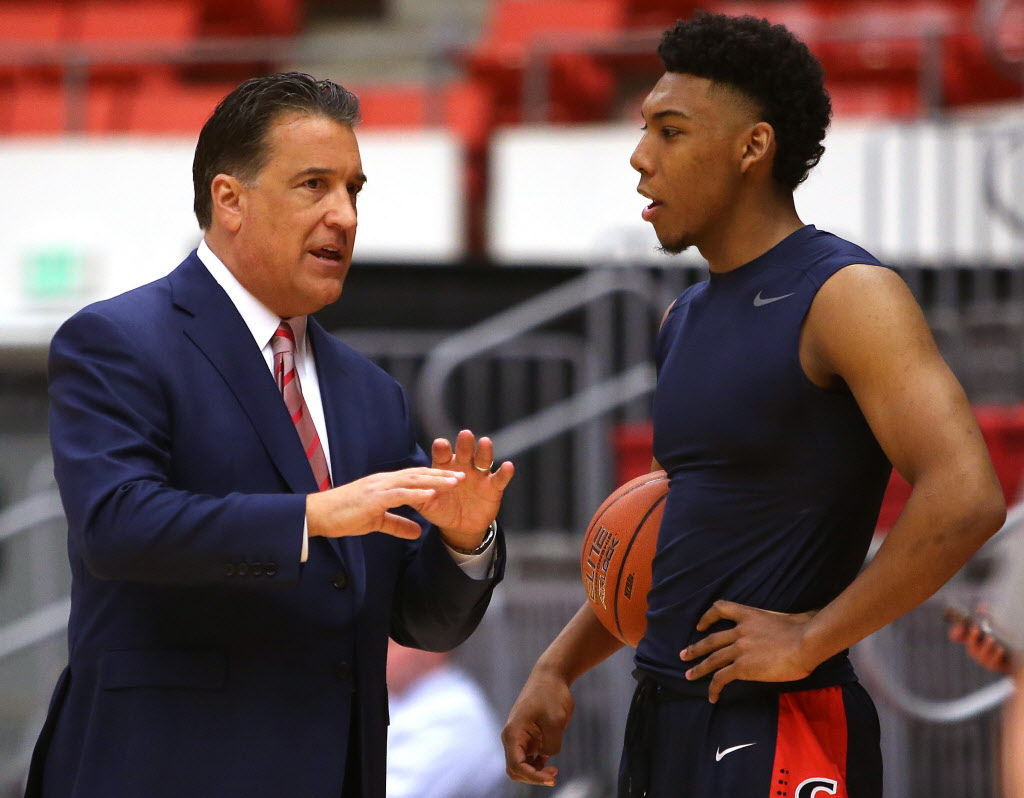The single most visible example yet of the NCAA’s efforts to reform college basketball will be on display this week.
At Grand Canyon University and three other regional sites around the country, the NCAA is paying for a total of about 1,200 college prospects and one parent or guardian to attend one of two three-day sessions involving drills, games and “life skills” conversations.
It’s a marked contrast from what the last weekend of July used to represent on the recruiting calendar — a monstrous collection of club-ball tournaments in Las Vegas — and it’s meant to be precisely that.
Recommendations from the NCAA’s Condoleezza Rice-led Commission on College Basketball, formed in the wake of the federal investigation, led to the formation of the camps as another way to pull players away somewhat from club-ball coaches and teams.
“Part of the Rice Commission was to deemphasize the influence of the club coaches who would otherwise have a sole voice in this process,” Dan Gavitt, the NCAA’s senior vice president for basketball, told the Star. “We don’t have the time and resources to eliminate them, nor do we want to, but we want to have other voices involved in this process.”
That means the 300-odd players headed to Phoenix will hear from people such as event commissioner Steve Lavin, the ex-UCLA and St. John’s coach, and assistant commissioner Earl Watson, the former UCLA standout and Phoenix Suns coach. West Region instructors will include Westmont College head coach John Moore and Orange Coast College coach Steve Spencer, a former UCLA assistant.
The NCAA is also putting the prospects into “life skills” talks every day, in addition to drills and games.
“Life skills sessions were meant to allow family, parents and guardians to be educated on initial eligibility standards, and about having access to agents for consideration of professional careers,” Gavitt said. “The NBA Players Association is involved with some of the life skills programs as well. It’s meant to be a collaborative effort of educating prospects on what the future will be like for them.”
The NCAA also added characteristic touches to the event, first by naming each camp as it names its tournament brackets — with the GCU camp, for example, known as the “West Region.”
Also, the camp selected prospects via a system where college coaches could vote for up to five “automatic qualifiers” they wanted to evaluate, and those five would be selected regardless of any other votes, while coaches could vote for up to 25 others who could get in as “at large” candidates if enough other coaches also selected them.
Then, once invited, players were assigned to teams named for an NCAA basketball champion — such as the 1997 Arizona Wildcats, which will include 2021 point guard Jaleon Israel of Gilbert Higley High School, along with players from California, Florida, North Carolina and Oregon.
The problem is, many high-level prospects won’t be there, including all of Arizona’s priority recruiting targets. That’s in part because it was difficult to distribute information about the first-year program, Gavitt said, while another is the fact that USA Basketball is holding a Junior Team camp with 75 elite prospects this week.
In addition, some of the old Las Vegas club-ball tournaments are still going on anyway, even though the NCAA is not allowing college coaches to watch them.
The Las Vegas Classic is planning to stream games for coaches to watch and the Big Time Las Vegas event (formerly the Fab 48) also is fielding well-known teams such as Dream Vision, Team Breakdown, Vegas Elite, Mater Dei and others.
The NCAA camps are “new and that always takes some adjustment,” Oregon coach Dana Altman said. “Some players are going to Colorado Springs and some players are staying with their AAU team. I think there will be some good young players (at the camps) but I know a lot of players didn’t register and aren’t sure how it all works.”
That means college coaches have some decisions to make this week.
“It’s gonna be tough,” Oregon State coach Wayne Tinkle said at Peach Jam earlier this month. “We’ve got (the NCAA camps) and Colorado Springs and we’ve gotta figure out where our guys are at the four sites, so we’ll kind of spread out accordingly.”
Gavitt said the USA Basketball camp will be moved to a different weekend next year so it won’t be in conflict, while he’s also hoping that players will become increasingly attracted to the NCAA camps instead of playing in the Las Vegas events.
Gavitt said players who attend the first session of the NCAA’s camp can still go join their club teams over the weekend, though some have opted out of the NCAA camps entirely.
“We definitely thought in this first year some of that would happen,” Gavitt said. “Players have choices to make. But we think it’s a great opportunity. It’s the only place college coaches can evaluate them this week.
“We have heard some anecdotes that some of the (club) programs are advising kids not to attend, which could be very disappointing. I think that speaks to some of the ills of the culture. But we’ll keep working at this and try to make it something prospects want to attend.”





